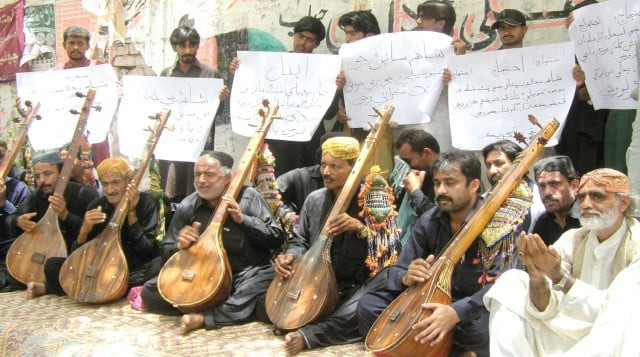Bhitai’s anniversary marred by conflict between descendants

During Waee (recitations of Bhitai’s written works) and Tamboura performances at the Hyderabad Press Club, Gada protested against what he claimed was an illegal takeover of Bhitai’s property and possessions.
“The usurper has taken control over Bhittai’s haveli in Bhitshah and has forbidden people from entering it,” said an outraged Gada.
He furthermore accused Nisar of selling Bhitai’s books and other possessions, adding that the belongings were the property of the government, and should be handed over to the Auqaf department, so that they can be preserved. He said that the haveli should also be handed over to the government so that it can be turned into a museum and opened to the public as a heritage site.
“The properties and assets of Jinnah, Iqbal and Bhutto were brought under [the government’s] control to protect their sanctity. It is sad that the legacy of this great scholar, who enlightened people and spread the message of peace, is in a dilapidated condition and susceptible to danger,” said Gada.
The feud between the family members started 20 years ago when Nisar was proclaimed the Gaddi Nasheen (heir) to the acquisition of the haveli, along with his son Syed Waqar Hussain Shah.
Gada, who is Nisar’s nephew, filed a case against his uncle around four years back, claiming that Nisar and his son had taken over the haveli illegally while he and his father, Allan Shah, and uncle, Teeral Shah, were the true Gaddi Nasheens of the property.
Homage to Bhitai
Sufi scholar and poet Shah Abdul Latif Bhitai was born in 1689 in Hala. He later settled down in the town of Bhit Shah, where he was buried in 1752.
Thousands of people from across the country visit his tomb during the two-day “Jashn-i-Latif festival”, which began on Monday this year. They lay wreaths of flowers on his tomb and attend performances by raag singers who supervise the shrine and pay tribute to Bhitai’s written works.
“It is about sending out Shah Bhitai’s message to as many people as possible,” said Juman, a 48-year-old Sufi singer who has been teaching and singing Shah Abdul Latif Bhitai’s raag outside Bhitai’s shrine for around 32 years.
Bhitai’s poetry illuminates the soul within, it brings out what is deep inside, he explained in reverent exuberance.
Devotees flock to the shrine to translate their love and reverence for the saint into music and poetry.
“We serve them tea and around 8:30 pm onwards they start their singing,” said Juman, adding that the verses were sung to the music of the Tamboura, an instrument that he said was invented by Bhitai himself. The Waee continues till the Fajr prayers, he said.
Published in the Express Tribune, June 15, 2010.


















COMMENTS
Comments are moderated and generally will be posted if they are on-topic and not abusive.
For more information, please see our Comments FAQ